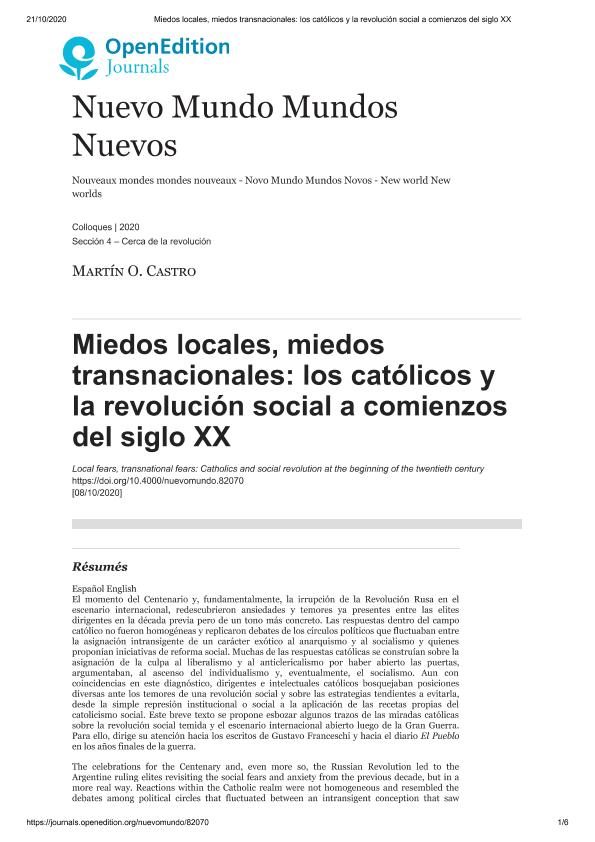Artículo
El momento del Centenario y, fundamentalmente, la irrupción de la Revolución Rusa en el escenario internacional, redescubrieron ansiedades y temores ya presentes entre las elites dirigentes en la década previa pero de un tono más concreto. Las respuestas dentro del campo católico no fueron homogéneas y replicaron debates de los círculos políticos que fluctuaban entre la asignación intransigente de un carácter exótico al anarquismo y al socialismo y quienes proponían iniciativas de reforma social. Muchas de las respuestas católicas se construían sobre la asignación de la culpa al liberalismo y al anticlericalismo por haber abierto las puertas, argumentaban, al ascenso del individualismo y, eventualmente, el socialismo. Aun con coincidencias en este diagnóstico, dirigentes e intelectuales católicos bosquejaban posiciones diversas ante los temores de una revolución social y sobre las estrategias tendientes a evitarla, desde la simple represión institucional o social a la aplicación de las recetas propias del catolicismo social. Este breve texto se propone esbozar algunos trazos de las miradas católicas sobre la revolución social temida y el escenario internacional abierto luego de la Gran Guerra. Para ello, dirige su atención hacia los escritos de Gustavo Franceschi y hacia el diario El Pueblo en los años finales de la guerra. The celebrations for the Centenary and, even more so, the Russian Revolution led to the Argentine ruling elites revisiting the social fears and anxiety from the previous decade, but in a more real way. Reactions within the Catholic realm were not homogeneous and resembled the debates among political circles that fluctuated between an intransigent conception that saw socialism and anarchism as foreign, and those who proposed social reform. Many Catholic responses were built upon the belief that liberalism and anticlericalism had opened the doors to the rising of individualism and, eventually, socialism. Even though intellectuals and Catholic leaders shared this diagnosis, they held different positions in the face of their fears of social revolution and about how to avoid it. These views went from an outright institutional or social repression to policies based on social Catholicism. This brief text aims at sketching the Catholic views regarding social revolution and the international scenario in the aftermath of the Great War. To do so, it pays attention to Gustavo Franceschi’s works and to the Catholic newspaper El Pueblo in the final years of the war.
Miedos locales, miedos transnacionales: los católicos y la revolución social a comienzos del siglo XX
Título:
Local fears, transnational fears: Catholics and social revolution at the beginning of the twentieth century
Fecha de publicación:
10/2020
Editorial:
École des hautes études en sciences sociales
Revista:
Nuevo Mundo Mundos Nuevos
e-ISSN:
1626-0252
Idioma:
Español
Tipo de recurso:
Artículo publicado
Clasificación temática:
Resumen
Palabras clave:
CATOLICOS
,
REVOLUCION SOCIAL
,
POLITICA
,
DEMOCRACIA
Archivos asociados
Licencia
Identificadores
Colecciones
Articulos(INSTITUTO "DR. E.RAVIGNANI")
Articulos de INST. DE HISTORIA ARGENTINA Y AMERICANA "DR. EMILIO RAVIGNANI"
Articulos de INST. DE HISTORIA ARGENTINA Y AMERICANA "DR. EMILIO RAVIGNANI"
Citación
Castro, Martín Omar; Miedos locales, miedos transnacionales: los católicos y la revolución social a comienzos del siglo XX; École des hautes études en sciences sociales; Nuevo Mundo Mundos Nuevos; 2020; 10-2020; 1-6
Compartir
Altmétricas




